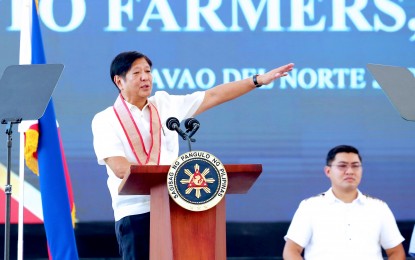
NOMAD VISA. President Ferdinand R. Marcos Jr. during his visit to Tagum City, Davao del Norte on June 6, 2024. Marcos has backed the proposal to issue an executive order that would introduce “nomad visas” and attract long-stay foreign visitors to the country. (PNA photo by Robinson Niñal Jr.)
MANILA – President Ferdinand R. Marcos Jr. has backed the proposal to issue an executive order (EO) to introduce “nomad visas” and attract long-stay foreign visitors.
The Private Sector Advisory Council for Tourism (PSAC-Tourism) suggested the issuance of EO for the immediate implementation of nomad visas “without tax incentives,” which it said could be added upon the passage of a related bill.
"We need to issue nomad visas quickly to attract long-stay tourists. Other countries like Thailand, Malaysia, and Indonesia are already benefiting from this approach,” LT Group Vice Chairperson and Chief Operating Officer Lucio Tan III said.
Marcos supported the interim solution and directed the Office of the Executive Secretary to draft the EO and select a pilot country for the initiative.
The PSAC-Tourism also looked forward to the development of the tourism sector amid the administration’s initiatives and strong push for travel into and within the country.
The council said a key focus should also be on supporting industry-specific training programs to equip individuals with the skills needed for immediate employment in tourism-related jobs.
"Eighty percent of our tourism workforce holds TESDA [Technical Education and Skills Development Authority] certifications. We should build on this by further increasing these certifications, with the private sector identifying the specific skills required," Filinvest Development Corporation President and Chief Executive Officer Joji Gotianun Yap said.
Marcos emphasized the role of industry in shaping these training efforts and sought its guidance on the “exact skills needed”.
He also highlighted the importance of short-term courses in allowing people to get jobs quickly.
Commission on Higher Education (CHED) Chair J. Prospero de Vera III elaborated on the strategic approach to tourism and hospitality education, citing the numerous institutions offering four-year degrees in Tourism and Hospitality Management.
“By allowing top schools to run these programs, we ensure quality and meet current needs. TESDA certifications can now be credited towards these degrees, providing students with a flexible pathway," he said.
PSAC-Tourism expressed confidence that these initiatives would position the Philippines as a prime destination for tourists, enhance the quality of its tourism workforce, and drive economic growth.
Marcos has earlier ordered government agencies to streamline e-visa processing for Indian nationals to boost the country's tourism.
In a statement dated July 4, the Department of Tourism (DOT) said this is a significant step towards increasing arrivals from India, one of the important source markets of the Philippines.
“The swift and efficient processing of e-visas for Indian visitors will undoubtedly streamline the entry procedures and provide a more welcoming environment for tourists from India,” it said.
“We believe that the President's emphasis on facilitating e-visa processing for Indian nationals will not only attract more visitors but also strengthen the cultural and economic ties between our nations. We are committed to working closely with all stakeholders to ensure the successful implementation of this initiative and look forward to a closer collaboration with our Indian counterparts,” it added.
The DOT then urged the Department of Foreign Affairs to actively drive the implementation of these e-visa reforms. (PNA)
